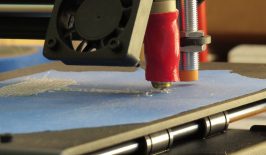In the second part of our interview series, Jasmina Schmidt spoke to Julius Mujuni from ENVenture, a social enterprise that supports local organisations in Uganda both with financing and capacity management, and helps them to open shops that provide energy-efficient and clean energy technologies in rural areas of the country.
In this third part, our editor meets Mukasa Nassar, the founder of Initiative Uganda and an ENVenture fellow, to talk about how their collaboration with ENVenture supports the day-to-day operations of their community-based organisation.
Mukasa, you are ENVenture fellow. What is Initiative Uganda and how did you get in touch with the program?
Initiative Uganda is a community-based organisation (CBO) dedicated to improving the living standards of young people and women in the community of Iganga. It was founded back in 2008, but we properly got started in 2011 after I finished university. I wanted to do something meaningful and so we set up a range of different initiatives in the areas of water and sanitation, health and HIV/AIDS prevention. In 2017 we contacted ENVenture. They help CBOs start sustainable businesses. That was a good move for us. We were still having problems raising money at the time. Fundraising is not easy for a small organisation. So we applied to ENVenture, they invited us to the boot camp and over four intensive days they taught us a lot of different things about green energy and business management.
What happened after the boot camp? And how is business at your shop?
After the training they gave us a 2000 USD loan so that we could set up our shop selling green energy products. The CBOs also have access to a Business Fellow. The volunteer who supported us was in the USA, so communication was sometimes a bit difficult because the internet is not always so stable here, but where there is a will, there is a way. So we started our green energy company, using a business model that’s slightly different from the usual ENVenture fellows. We had already rented an office a little outside the city and didn’t have enough money at the time to open a new store in the city. But we found a good solution: collaborating with women’s groups and individual women with shops in the city. We get them the products and they sell them to the members of their communitys. For every product they sell, we pay them a small commission. This has worked well for us because it gives us great reach. We have our representatives in strategic locations and that’s where we sell our green energy products – mainly stoves and solar lanterns. With the solar lanterns, we’re targeting rural communities that still use kerosene lamps.
But right now you sell more than just green energy products – you also produce and sell reusable sanitary towels. How did that start?
We have always looked for ways to help our community. One big problem for girls and women is firstly the cost of conventional menstrual hygiene products and secondly their availability in more remote regions. That means that, especially in rural communities, some girls end up dropping out of school because they have no access to such products during their period. So we looked for a sustainable solution for those young women and right now we are producing sanitary towels that are easy to wash and reuse and are also inexpensive. We have so far reached about 400 to 600 girls, mainly in rural areas. We also employ local women to sew the towels and in that way provide socially disadvantaged families with an additional income.
The process and knowledge behind our new reusable sanitary towel project came from the green energy business that we already had, the “first child” of that, in a way. We owe part of the success of our initiative to ENVenture, because we didn’t know used to how to be successful in the market before that.
Do you have other plans for the organisation?
Last year we started another project. One of the aims of our initiative is to promote education, especially in rural areas. That’s why we set up a small social enterprise that focuses on education, the Harvest Junior School. We succeeded in registering around 20 children for the first class and they just successfully completed their first year.
The last few years have been challenging, but also very experienced and exciting, because we can see that the projects are working and moving forward. In the beginning we lacked that knowledge. We thought that in order to do business we had to have a lot of money – that’s not true. We already have an idea for another project to support young adults. We want to train them to produce the energy-efficient stoves here and we’ve already received a small grant to help us. In the near future we want to become one of ENVenture’s suppliers and supply the communities with those stoves.
What do you think about the cooperation with ENVenture and the experiences you have made with it?
I am completely focused on green solutions from a business perspective these days. We’re running a business, but ultimately it’s about helping the community. Social programs and green tech solutions – these projects are sustainable and we want them to carry on.
Thanks, Mukasa!
This is a translation by Marisa Pettit of an original article which first appeared on RESET’s German-language site.






